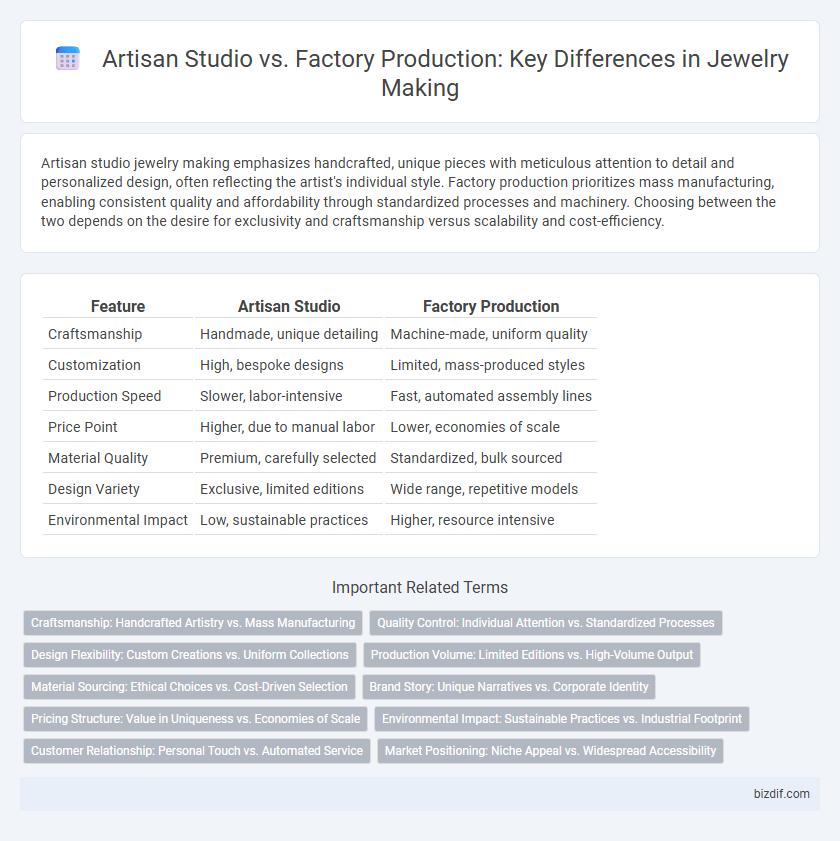Artisan studio jewelry making emphasizes handcrafted, unique pieces with meticulous attention to detail and personalized design, often reflecting the artist's individual style. Factory production prioritizes mass manufacturing, enabling consistent quality and affordability through standardized processes and machinery. Choosing between the two depends on the desire for exclusivity and craftsmanship versus scalability and cost-efficiency.
Table of Comparison
| Feature | Artisan Studio | Factory Production |
|---|---|---|
| Craftsmanship | Handmade, unique detailing | Machine-made, uniform quality |
| Customization | High, bespoke designs | Limited, mass-produced styles |
| Production Speed | Slower, labor-intensive | Fast, automated assembly lines |
| Price Point | Higher, due to manual labor | Lower, economies of scale |
| Material Quality | Premium, carefully selected | Standardized, bulk sourced |
| Design Variety | Exclusive, limited editions | Wide range, repetitive models |
| Environmental Impact | Low, sustainable practices | Higher, resource intensive |
Craftsmanship: Handcrafted Artistry vs. Mass Manufacturing
Artisan studios emphasize handcrafted artistry, where skilled jewelers meticulously create unique pieces with attention to detail and personalized design. Factory production relies on mass manufacturing techniques, utilizing automation to produce large quantities of jewelry with consistent quality but less individual character. The distinct craftsmanship in artisan studios results in exclusive, bespoke items, contrasting with the uniformity and efficiency of factory-made jewelry.
Quality Control: Individual Attention vs. Standardized Processes
Artisan studios emphasize quality control through individual attention, allowing skilled jewelers to meticulously inspect and refine each piece, resulting in unique craftsmanship and higher-quality details. In contrast, factory production relies on standardized processes and automated systems to maintain consistency and efficiency across large batches, though this can sometimes lead to less personalized quality oversight. The personalized approach in artisan studios often leads to superior finishing and bespoke features, while factories prioritize uniformity and scalability.
Design Flexibility: Custom Creations vs. Uniform Collections
Artisan studios excel in design flexibility, offering bespoke jewelry pieces tailored to individual preferences and intricate craftsmanship that reflects personal stories. Factory production prioritizes uniform collections, enabling mass manufacturing with consistent quality but limited customization options. Custom creations from artisan studios often feature unique details and artisanal techniques, contrasting with the standardized designs of factory-made jewelry.
Production Volume: Limited Editions vs. High-Volume Output
Artisan studios specialize in creating limited edition jewelry pieces, emphasizing unique craftsmanship and intricate details that cater to individual tastes and exclusivity. Factory production focuses on high-volume output, using automated processes to produce large quantities of uniform jewelry efficiently. Limited editions from artisan studios often result in higher value and collectible appeal compared to the mass-produced items found in factory settings.
Material Sourcing: Ethical Choices vs. Cost-Driven Selection
Artisan studios prioritize ethical material sourcing by selecting conflict-free gemstones and sustainably harvested metals, ensuring transparency and environmental responsibility throughout the supply chain. Factory production often emphasizes cost-driven selection, opting for lower-priced materials that may lack certification or traceability, potentially compromising ethical standards. This fundamental difference impacts the overall quality, sustainability, and consumer trust associated with the final jewelry piece.
Brand Story: Unique Narratives vs. Corporate Identity
Artisan studios craft jewelry with unique narratives that reflect individual creativity and cultural heritage, enhancing brand authenticity and emotional connection. Factory production emphasizes consistent corporate identity, ensuring uniformity and scalability across product lines. The choice between the two influences how consumers perceive brand value, storytelling, and exclusivity in the jewelry market.
Pricing Structure: Value in Uniqueness vs. Economies of Scale
Artisan studios command higher prices due to handcrafted uniqueness and bespoke designs that emphasize individual craftsmanship and limited editions. Factory production benefits from economies of scale, reducing costs through mass production and standardized processes but often at the expense of distinctiveness. Consumers seeking exclusive, personalized jewelry typically accept premium pricing for artisan work, while factory-made pieces appeal to budget-conscious buyers prioritizing affordability.
Environmental Impact: Sustainable Practices vs. Industrial Footprint
Artisan studios prioritize sustainable practices by using recycled metals, ethically sourced gemstones, and minimal energy consumption, significantly reducing their environmental footprint. Factory production relies on mass manufacturing techniques that often involve high energy use, chemical waste, and large carbon emissions, contributing to environmental degradation. Choosing artisan-crafted jewelry supports eco-friendly processes and promotes responsible resource management within the jewelry industry.
Customer Relationship: Personal Touch vs. Automated Service
Artisan studios emphasize personalized customer relationships by offering tailored consultations and unique, handcrafted jewelry pieces that reflect individual preferences. Factory production relies on automated service systems, prioritizing efficiency and large-scale output but providing limited personal interaction. This distinction highlights the artisan studio's advantage in fostering trust and emotional connection with clients through customized craftsmanship.
Market Positioning: Niche Appeal vs. Widespread Accessibility
Artisan studios in jewelry making carve out niche appeal by emphasizing handcrafted uniqueness, limited editions, and personalized designs that attract discerning customers seeking exclusivity. Factory production prioritizes widespread accessibility through mass production techniques, allowing for lower costs, consistent quality, and broad market reach. The contrasting market positioning highlights artisan studios' value in luxury and bespoke segments versus factories' dominance in affordable and mainstream jewelry offerings.
Artisan Studio vs Factory Production Infographic

 bizdif.com
bizdif.com